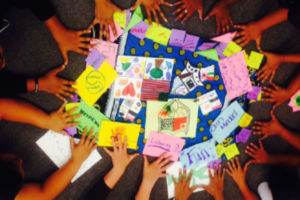Students at Queensland, Australia’s St. Mary’s Catholic School recently learned about folks in their community who struggle with basic necessities like food and water, and they decided to do something about it.

Students at Queensland, Australia’s St. Mary’s Catholic School recently learned about people in their community who struggle with accessing basic necessities like food and water, and they decided to do something about it.
“We were learning about how we should be grateful for the things we’re given,” third-grader Patrick Chopping told The Bulletin.
Chopping and his classmates spent several days scavenging for items to donate to the local Homeless Connect – shoes, clothes, blankets, and other supplies – as part of a project set in motion by Councilor Rose Swadling, who emailed teacher Ruth Coughlan about giving a helping hand.
The students didn’t disappoint.
“I gave the children a challenge to fill five Gormans moving boxes within eight days … they filled them in three days,” Coughlan told the news site.
In total, the students and their families donated enough to fill 21 boxes over the course of 13 days.
Patrick told The Bulletin the items should be enough to help 100 homeless people.
“The families of our students were simply amazing with their generosity of clothing, bedding, food and toiletries,” Caughlan said.
“Gormans Removals donated the moving boxes and we are extremely grateful for that,” she said.
Syracuse University philosopher Laurence Thomas wrote about the dynamic of “Gratitude and Social Equality” for The Hedgehog Review, a publication of the Institute for Advanced Studies in Culture at the University of Virginia.
Thomas explained that it’s through gratitude that people acknowledge the significance of each other to form basic social connections.
“When a person acts in good will towards another, then she or he is acknowledging that the other has moral value,” Thomas wrote. “Gratitude is a natural response to being so treated.”
The Jubilee Centre for Character and Virtues at the University of Birmingham offers a teacher handbook to help educators grow gratitude in students to cultivate an appreciative outlook on life.
“Gratitude has been associated with a host of benefits, both individually and interpersonally. It has been found to play a role in increasing and maintaining subjective wellbeing or happiness, and satisfaction with life,” according to the handbook.
“From a more collective point of view, gratitude promotes pro-social behavior and strengthens social bonds. Gratitude has been shown to lead to improved mental health in clinical and educational contexts.”
The handbook provides activities that encourage youngsters to “cultivate a sense of appreciation for the network of people from whom they receive benefits,” and “to reflect on the meaning of gratitude” outlined in an associated workbook.



